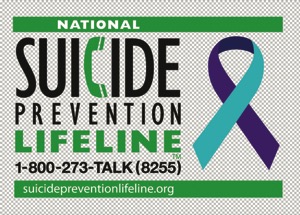
In the past few weeks, I’ve had yet another transgender woman friend I’ve met through activism take her own life. It shook me.
Like me, she had an underlying mental health condition; well, let’s not sugar coat it. She, like me, lived with a mental illness. Ours both had depression as components of that mental illness. In a community where suicide is already a high risk issue, we both had an added high risk element.
In her last posts on Facebook she talked about feeling like a “worthless loser” because she didn’t get a particular job promotion she’d been up for, so it’d be easy to say “Aha! That’s the reason she took her own life!” But it’s always more complex than that.
“I wish it were this simple to talk about my mental illnesses,” she wrote in another post from the last week of her life. “But the fact is that I am very scared of the harm caused by the stigma. It’s hard enough just surviving with what I have. There are times when telling others helps. But the fact is that I have lost relationships and opportunities because I revealed my issues. The fact remains that neurotypicals are often afraid of, misunderstanding of, and devaluing of people with issues like mine. It would be a relief to talk more about it, but I can’t. Not publicly anyway.”
There were warning signs, yet at the same time there were no alarm bells I could see just from her Facebook posts, which is all I had as indicators. There was honestly nothing I could do.
In my own life, I do everything I’m supposed to do to stay within therapeutic and meditative compliance so I don’t lose control of my life. When I get in emotional distress, I reach out. I even have a comfort animal – my 13-year-old kitty Bon-Bon – who helps me in my day-to-day life.
I know what works for me to stay alive, yet I know my regimens don’t work for every trans woman who has an underlying mental illness.
There is crisis help. There are people who care. When my friend, in her very last Facebook post, mentioned suicide, her friends who saw her post before I did immediately suggested the National Suicide Prevention Lifeline at 800-273-TALK (8255). She was already gone by the time the comments were made.
In late 2012, when I was in emotional crisis, I called the National Suicide Prevention Lifeline and pressed “1” for veterans. I needed help, and reached out for it.
Crisis help can lead to more help. We have to start somewhere.
I recognized at the time that if I took my own life, someone would find my body, and others would have to pick up the pieces, such as my funeral. Others who loved me would mourn me. I wanted to spare others from this, and let them love and help me then.
My friend’s death this past week has again left me evaluating my life. I’ve gone through so many changes in the past few months, and her death seems an impetus for even more evaluation and change. Oddly, my friend’s death has left me aware that I want to spend more time with my cat Bon-Bon.
It’s strange to put it in terms of my cat, but what I’m seeing as valuable to me is relationships I care about. My dad, Jack Sandeen, told me something around the time of his passing that’s come back to the forefront of my mind: “When people get close to dying, they don’t usually say they wish they spent more time at work. They usually say they wish they spent more time with family and friends.”
I’ve always thought of my pets as family and friends. Bon-Bon is my family, and a good, non-judgmental friend.
Bon-Bon is to me now a symbol for all my important relationships, I feel.












This is truly sad.
The TG community is a hostile and dysfunctional place. these sorts of things wouldn’t happen if the goal in transition was to make a life for one’s self in the larger world.
Liz